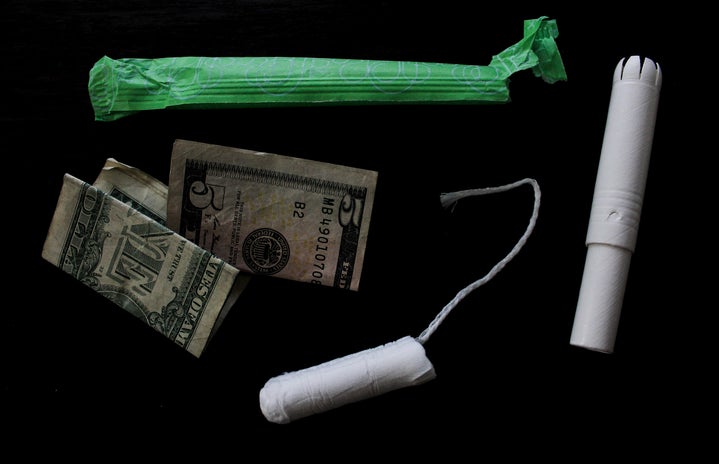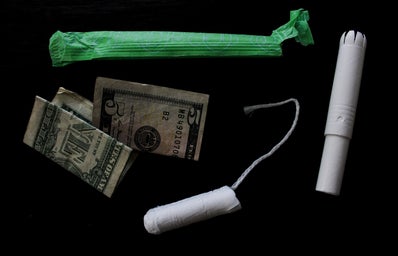800 million women and girls around the world are menstruating at any given time. One in five girls around the world are missing school because they are unable to manage their period. Around 216,000 women in the United States are homeless and have no access to adequate menstrual care. 30 states in the United States place taxes on menstrual products like pads and tampons, and other feminine hygiene products. 500 million women and girls are living in period poverty.
What is it?
Period poverty is the lack of adequate feminine care products like tampons and pads, fettered access to the necessary sanitation and waste disposal facilities or resources, and unaffordability of menstruation products due to luxury taxing that plagues so many women and girls in the United States and across the globe.
Furthermore, as a community of women, we at Her Campus are likely to focus on the experiences of just women and girls. But it is important to recognize that not all menstruators are women, and not all women menstruate; the additional shame and stigma that society’s associations of menstruation place on trans individuals is another way that period poverty manifests itself across the globe.
Why is it a Problem?
There is cultural shame and stigma placed upon menstruation in every society. In many countries, menstruation ostracizes women and girls from basic activities like socializing, attending school, and working every day. Misconstruities that periods make a woman unclean, impure, and inept are disempowering and unjustly discriminating against women in their natural form.
These psychological and social damages caused by misinterpretations of menstruation are compounded by frequent shortages of resources for women to manage their period cycles and routinely go about their lives. For example, over one billion women and girls in developing countries lack access to running water or adequate sanitation to maintain proper health during their periods.
Beyond a lack of access, women also suffer from an inability to afford and obtain sufficient period products. In the United States, tampons and other menstruation products are taxed in 30 states as luxury products. Many states also do not include period products as eligible to purchase with food stamps or SNAP benefits, which leaves countless impoverished women unable to manage their periods appropriately.
Why does it matter?
Stigma and misinformation about periods produced by society disenfranchise women and girls, causing them to become ashamed and embarrassed about the nature of their bodies. Such devaluation of the female body is dangerous for the progress of society and certainly for the advancement of women and girls in the social, political, economic, educational, and occupational spheres.
Without the availability of safe and hygienic products, women are forced to use makeshift materials like toilet paper, cardboard, rags, and straw, or must go without protection and seclude themselves from society or risk humiliation. These alternatives to traditional tampons and pads can lead to physical health risks like reproductive and urinary tract infections. Women who are fortunate enough to have access to minimal period products risk dangerous ailments like toxic shock syndrome because they have to overuse and reuse the few products that they can obtain.
Aside from health complications, the unavailability of sufficient menstruation management results in young girls missing up to 20 percent of school time, which increases their chances of entering into child marriages, experiencing domestic violence, and suffering from malnourishment.
Taxes and inappropriate government regulations on menstrual products strip homeless and impoverished women of their dignity during their cycles. This manifestation of period poverty disempowers women and disregards their value in society, which again diminishes their opportunity for advancement.
Young boys benefit from menstrual hygiene education, too. Educating girls and boys on menstruation at an early age at home and school promotes healthy habits and breaks stigmas around the natural process. Achieving menstrual equity means access to sanitary products, proper toilets, hand washing facilities, sanitation, and hygiene education, and waste management for people all around the world, not just females.
What can I do?
Undoubtedly, period poverty is not an issue that will be fixed overnight, but here are some realistic strategies to get involved in the effort to eradicate period poverty.
-
Join the protest against tampon taxes with Tax Free Tampon by contributing to collective actions that will support lawsuits against state legislation.
-
Seek out local chapters of nonprofit organizations like Period. and GirlUp that empower young women and engage in activism to end period poverty both in the United States and abroad.
-
Donate spare period products to local shelters, women’s resource centers, or national organizations like Helping Women Period.
-
Purchase your period products from brands like Lola that seek to eliminate period poverty by destigmatizing menstruation, rejecting the perceptions of feminine care products as luxury, and providing period products to women in need with every purchase.
-
Set an example of destigmatizing menstruation and empowering women and girls for the wonder of their natural bodies.



